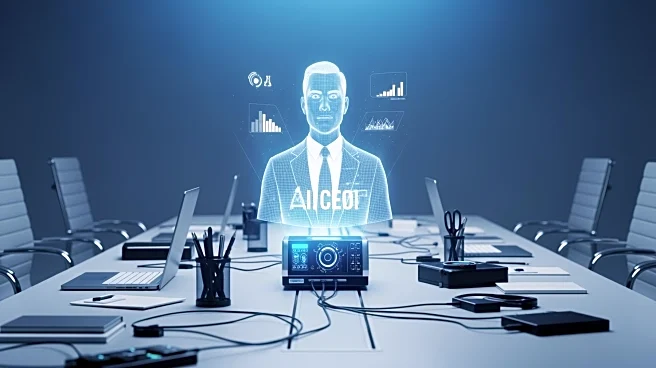What's Happening?
Companies are increasingly creating AI versions of their CEOs to make leadership more accessible to employees and the public. This trend is driven by the desire to have a CEO available at all times, capable
of communicating in multiple languages, and reducing the need for travel. For instance, Klarna has launched a hotline where people can interact with an AI version of its CEO, Sebastian Siemiatkowski, to inquire about company operations. Similarly, Salomon is experimenting with an AI persona of its CEO to ensure global employee access and preserve leadership vision. The development of these AI avatars involves using company data and the CEO's public appearances to create a digital twin that can handle specific topics like financial history or HR resources.
Why It's Important?
The integration of AI CEO avatars represents a significant shift in how companies manage leadership accessibility and communication. This development could potentially streamline operations, reduce travel costs, and enhance employee engagement by providing constant access to leadership insights. However, it also raises concerns about the future of jobs, particularly in the tech sector, where AI advancements have already led to significant staff reductions. While AI avatars are intended as extensions rather than replacements of CEOs, the broader adoption of AI in business processes could lead to changes in workforce dynamics, potentially affecting employment opportunities in white-collar professions.
What's Next?
As more companies explore the use of AI avatars, there may be increased scrutiny on data privacy and regulatory compliance, given the sensitive nature of the information used to train these AI models. Companies will need to ensure that their AI systems are compliant with data privacy laws and that they are transparent about how AI is used in their operations. Additionally, there may be further developments in AI technology that could enhance the capabilities of these avatars, making them more integral to business operations. Stakeholders, including employees and industry leaders, will likely continue to debate the implications of AI on job security and the evolving role of human leadership in the workplace.
Beyond the Headlines
The rise of AI CEO avatars could have deeper implications for corporate culture and leadership dynamics. As AI becomes more integrated into leadership roles, there may be ethical considerations regarding decision-making processes and the authenticity of leadership interactions. Companies will need to balance the benefits of AI accessibility with the need to maintain genuine human connections and leadership integrity. This development also highlights the ongoing evolution of AI technology and its potential to reshape traditional business practices, prompting discussions about the future of work and the role of technology in shaping organizational structures.










